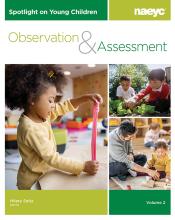Spotlight on Young Children: Observation and Assessment, Volume 2

Hilary Seitz
About the Book
Meaningful, developmentally appropriate observation and assessment are core components of every early learning setting. In today’s world of data collection, high-stakes testing, and accountability, it is vitally important to understand how to effectively assess young children in familiar settings; use this data to inform the curriculum; and communicate this information with staff, families, and communities.
Carrying on the work of the first volume of Spotlight on Young Children: Observation and Assessment, this book brings together all-new articles curated by Hilary Seitz, director for educator and leadership programs in the California State University system. Organized into three distinct parts, the contributions
-
Discuss changing the landscape of observation and assessment
-
Emphasize the need for assessment to be culturally and linguistically responsive
-
Showcase a variety of reasons why educators use observation and assessment, exploring information about the foundations and meanings behind them
-
Highlight different facets of the authentic assessment process and how to capture thinking and learning moments
-
Address reflecting on, celebrating, and including all children by identifying their unique strengths and needs and using a variety of supporting strategies
Each article in this collection is accompanied by questions to prompt deeper thinking on the content. With this resource, continue to grow your understanding of how observation and assessment can guide your instruction and promote children’s learning.
Table of Contents
Table of Contents
-
Introduction
Hilary Seitz -
Part One: Purposes of Observation and Assessment
-
Foundations of Assessment for Preschool Settings
Catherine Scott-Little, with Kathy L. Reschke -
Meaningful Assessment and Documentation: How Directors Can Support Teaching and Learning
Debbie LeeKeenan and Iris Chin Ponte -
Assessing Agency in Learning Contexts: A First, Critical Step to Assessing Children
Natacha Ndabahagamye Jones, Amber T. Fowler, and Jennifer Keys Adair
-
Foundations of Assessment for Preschool Settings
-
Part Two: Strategies for Observing and Assessing
-
Authentic Assessment: A Strengths-Based Approach to Making Thinking, Learning, and Development Visible
Hilary Seitz -
Anecdotal Records: Practical Strategies for Taking Meaningful Notes
Celeste C. Bates, Stephanie M. Madison, and Hayley J. Hoover -
Bringing Observation and Documentation to Life in Infant and Toddler Settings
Rebecca Parlakian -
Unlocking the Potential of Data-Driven Coaching: Child Assessment Evidence as a Guide for Informing Instructional Practices
Christine M. Snyder and Holly P. Delgado -
Effective Kindergarten Readiness Assessments: Influencing Policy, Informing Instruction, and Creating Joyful Classrooms
Elliot Regenstein, Maia C. Connors, Rio Romero-Jurado, and Joyce Weiner -
Photographs and Learning Progressions: Supports for Intentional Assessment and Instruction in Mathematics
Sarah Roller Dyess, Elizabeth Petit Cunningham, and Katherine Ariemma Marin
-
Authentic Assessment: A Strengths-Based Approach to Making Thinking, Learning, and Development Visible
-
Part Three: Assessment Practices to Support Inclusion
-
Assessing Opportunities to Support Each Child: 12 Practices for Quality Inclusion
Camille Catlett and Elena P. Soukakou -
Embedded Learning Opportunities for Children with and Without Disabilities
Christan G. Coogle, Emily M. Rose, Jennifer R. Ottley, Jennifer A. Brown, and Mollie K. Romano -
Authentic and Meaningful Developmental Screening in Early Childhood
Marisa Macy and Stefano J. Bagnato -
Enhancing Toddlers’ Communication Skills: Partnerships with Speech-Language Pathologists
Janet L. Gooch
-
Assessing Opportunities to Support Each Child: 12 Practices for Quality Inclusion
- Index
Book Details
Book Details
Product Code: 1168
ISBN: 978-1-952331-25-1
Publish Date: 2024
Citation (in Chicago 17th ed. style): Seitz, H., ed. 2024. Spotlight on Young Children: Observation and Assessment. Vol. 2. Washington, DC: NAEYC.
Related Resources
Related Resources
Articles
“Breaking Down STEAM for Young Children. Part 4: Practical Approaches to Informal Assessment” - Authors Angela Eckhoff and Sandra M. Linder take a deeper look at developing informal assessment strategies during STEAM experiences in this final article of their four-part series exploring STEAM activities in early childhood settings. (Teaching Young Children, October/November 2020)
“Not Just Handwriting and Spelling: Assessing Early Composing Skills” - In this article, Margaret F. Quinn and Rebecca Rohloff explore all three components of composition—transcription, connection, and discourse—in action and how educators can assess and support children’s early composition, especially during the preschool years. (Young Children, Spring 2023)
Hilary Seitz
Hilary Seitz, PhD, is director for educator and leadership programs in the California State University system. She advocates and supports statewide efforts to support early childhood education and the new California PK–3 Early Childhood Education Specialist Instruction Credential. Dr. Seitz is professor emerita in early childhood education at the University of Alaska Anchorage. Her research areas have been in early literacy development, collaborative practices between families and schools including culturally responsive pedagogies, emergent curriculum development, documentation, authentic assessment, and social constructivist learning theories inspired by Reggio Emilia practices.
Reviews
In a time when assessment is frequently associated with formal testing that takes precious time away from instruction, the authors demonstrate how authentic assessment can shape teachers’ decisions about creating optimal learning environments for young learners. Aligned with the principles and guidelines of the fourth edition of Developmentally Appropriate Practice, this book is a valuable resource in the toolbox of novice and experienced early childhood educators.
—Elena Bodrova, Cofounder and Knowledge Advisor, Tools of the Mind
Navigating the challenges of assessment in education is no easy task. This new volume manages to address the anxiety around the topic by offering actionable insights that educators across the early childhood continuum can utilize to benefit children.
—Vincent J. Costanza, Principal, Campbell Elementary School
Full of research-based information, strategies, and examples, this highly readable book is a must for students, teachers, and directors seeking to better understand the whats, whys, and hows of authentic, data-driven, individualized, and equitable assessment for all children.
—Mary Benson McMullen, Professor of Early Childhood Education, Indiana University Bloomington
